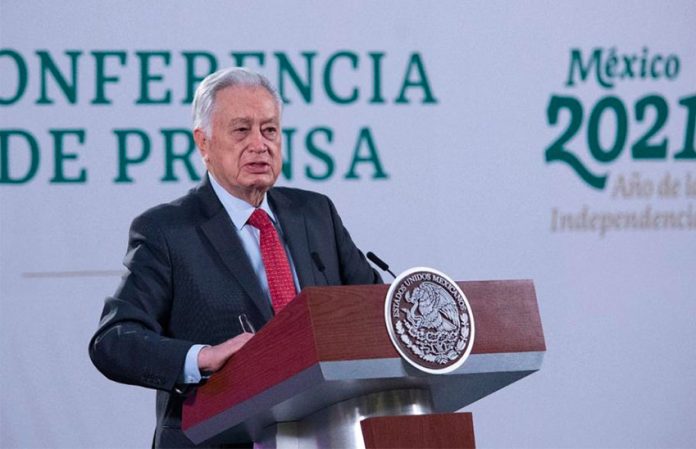Federal Electricity Commission (CFE) chief Manuel Bartlett reaffirmed Friday that private energy companies don’t pay to use state-owned transmission lines and claimed that they have stolen 76,000 customers from the public utility.
Speaking at President López Obrador’s morning press conference, Bartlett, an 85-year-old former federal cabinet minister and ex-governor of Puebla, said private companies have 223 “self-supply” power plants and tens of thousands of phony partners.
Reiterating a point he has made previously, including during an interview last May, the CFE chief said that large companies join partnerships with private energy firms to get around having to purchase power from the CFE.
Bartlett said last May that large companies like corporate conglomerate Grupo Salinas, convenience store chain OXXO, big-box store Walmart, cinema chain Cinépolis, manufacturer Kimberly Clark and others pay very low electricity rates because they are passed off as partners of firms such as Iberdrola, Enel Energía and American Light and Power.
Their “simulated” partnerships allow the client firms to receive electricity without paying for transmission costs, he said.
Bartlett said Friday that the arrangements were “a fraud of the law.”
“Although it’s illegal, although it’s a crime, they [the private energy companies] don’t pay [to use] the [state-owned] network. … They have 76,000 fake customers,” he said.
Bartlett also said that the CFE has accrued losses of 437 billion pesos (US $21.2 billion) because of electricity dispatch rules.
He said the CFE is forced to buy power for the national grid from private companies – which generally generate cleaner and cheaper energy than the commission – and can’t place all of the electricity it generates in the system.
“We have a loss of 215 billion pesos by not dispatching [our energy],” he said. “… And due to the energy the CFE has to buy from private companies, the CFE loses 222 billion pesos more. … We have to buy energy from private companies, this requirement is absurd but that’s the reality of the [previous government’s] energy reform.”
The Congress recently passed a new Electricity Industry Law which gives CFE-generated power priority on the national grid over that produced by private and renewable energy companies. But the law was promptly suspended through a court injunction and more court rulings against the legislation have followed.
![]()
López Obrador said last week that he would send a bill to Congress to change the constitution if the new electricity law is deemed unconstitutional. He doubled down on Friday, saying that the government won’t be bumped off course despite the legal action against the law.
If his administration changed course, it would become an accomplice to corruption, said the president, who claims that the 2014 energy reform allowed foreign and private companies to loot Mexico.
López Obrador said that companies challenging the law don’t want to lose their privileges, such as government subsidies, in the Mexican energy market.
“As they don’t want to lose those privileges, they go to judges and seek to protect themselves and they have the support of the media with [some] honorable exceptions,” he said.
López Obrador charged that the Spanish newspaper El País is opposed to his government because it is owned by companies that have looted Mexico. “They saw Mexico as a land of conquest,” he said.
“We offer them an apology but we’re not going to allow them to continue looting and hopefully they understand us. It’s the same thing with Reforma and El Universal and even The New York Times because they’re [pro] business newspapers that have forgotten ethics and forgotten that the media should be as close as it can to the citizens and the truth and as far away as it can from … economic power – that’s journalism,” López Obrador said.
“In this case, … all of them are against us but we’re not going to move because we would become accomplices of corruption, we would be accessories and we came to government to end corruption, the cancer that destroys our country.”
Bartlett also railed against judges that have opposed government efforts to guarantee the stability of the national electricity network.
“They’ve given permits without limits to everyone that wants them – they are mainly intermittent [energy generators], wind farms and solar farms that represent a serious risk for the stability of the network. Intermittence creates big problems,” he said.
“The judges haven’t realized that the the network must maintain balance and reliability; … if this intermittent [energy] is injected … it is placed at risk. The judges voted against an agreement to guarantee the stability of the network,” Bartlett said, apparently referring to a Supreme Court ruling against the government’s energy reliability policy.
The government has been widely criticized for its energy sector reforms that many analysts say will discourage private investment. It has also been criticized for its opposition to renewables and reliance on fossil fuels at a time when much of the world is moving to phase out the use of coal and other highly-contaminating energy sources.
Source: El Universal (sp), El Financiero (sp), Reforma (sp)
